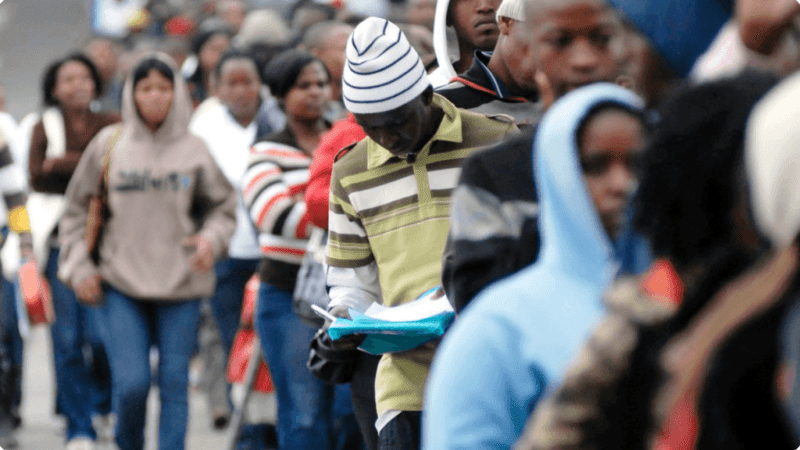
Abuja, Nigeria – July 2025 – Behind every idle youth, abandoned workshop, and shut-down startup lies a national emergency many have refused to confront: the silent crisis of unemployment. As Nigeria’s population surges past 220 million, the gap between job seekers and job opportunities continues to widen—especially among young people. Without urgent, targeted interventions, the consequences could destabilize not just the economy, but the very fabric of society.
A Generation at Risk
According to the National Bureau of Statistics, Nigeria’s youth unemployment rate currently hovers around 47%, with underemployment affecting millions more. From university graduates to skilled artisans, young Nigerians face a grim reality: years of study often lead to months—or even years—of joblessness.
“I finished my NYSC two years ago,” says Favour, a 27-year-old graduate in Port Harcourt. “I’ve applied to over 100 jobs, attended training programs, but I’m still relying on my parents to survive.”
For many, unemployment isn’t just an economic issue—it’s psychological. Feelings of hopelessness, depression, and frustration are on the rise, especially in urban slums and rural areas where opportunities are scarce.
Why This Crisis Persists
Several factors fuel Nigeria’s chronic unemployment:
- Mismatch of skills: Thousands graduate annually with degrees in fields with few market opportunities, while sectors like agriculture, manufacturing, and digital technology lack trained personnel.
- Lack of industrial growth: The collapse of local industries and dependence on imports mean fewer jobs are created domestically.
- Policy inconsistency: New job creation schemes often suffer from poor implementation, corruption, or sudden government changes.
- Limited access to capital: Many youths have ideas but no access to loans, grants, or investment support.
The result? Talented, driven individuals stuck in a cycle of unproductivity—while the country bleeds potential.
Economic and Security Fallout
The economic cost is staggering. A nation with millions of idle youths also risks increased crime, cyber fraud, drug abuse, and even terrorism recruitment. Security experts link rising cultism, robbery, and ritual killings directly to youth unemployment.
“This is not just an economic issue—it’s a national security threat,” says Dr. Olumide Bakare, an economist in Lagos. “When young people can’t find purpose or income, they become vulnerable to radicalization.”
What Leaders Must Do—Now
Solving unemployment requires more than slogans and temporary empowerment programs. Nigeria needs a bold, strategic, and inclusive approach. Experts and youth advocates recommend the following urgent steps:
1. Massive Investment in Vocational Training
Redirect focus from degrees to skills. Expand and modernize vocational centers across Nigeria, and partner with the private sector to ensure training is linked to real jobs.
2. Tech and Digital Economy Integration
Create tech parks in each geopolitical zone. Support startups with tax holidays, grants, and access to markets. Nigeria’s digital economy can employ millions if the infrastructure and support are in place.
3. Revamp Agriculture and Agro-processing
Make agriculture attractive again. Support youth-led agribusinesses with land, modern tools, training, and export access. Rural farming communities can become hubs of employment.
4. Inclusive Loan and Grant Schemes
Establish a transparent, decentralized youth enterprise fund with zero-collateral microloans. Remove bureaucratic bottlenecks and ensure gender inclusivity.
5. Public Works and Infrastructure Jobs
Launch large-scale infrastructure projects that prioritize local labor. From road construction to housing, there are millions of unskilled and semi-skilled youths who can be absorbed immediately.
A Time to Act, Not Just Talk
While government programs like N-Power, YouWin, and NYIF have made dents, they remain drops in the ocean. Without nationwide scale, monitoring, and sustainability, they cannot solve a crisis this large.
“We don’t need promises. We need policies that work,” says Adamu, a 30-year-old welder in Kano. “We want to earn a living, not beg for survival.”
The Window Is Closing
Nigeria stands at a crossroads. Either leaders act decisively to turn the country’s youth bulge into a demographic dividend—or risk facing social unrest, mass migration, and economic collapse.
The silent crisis of unemployment can no longer be ignored. The future of Nigeria depends on the work, creativity, and energy of its young people.
To unlock that future, leaders must act—today.










